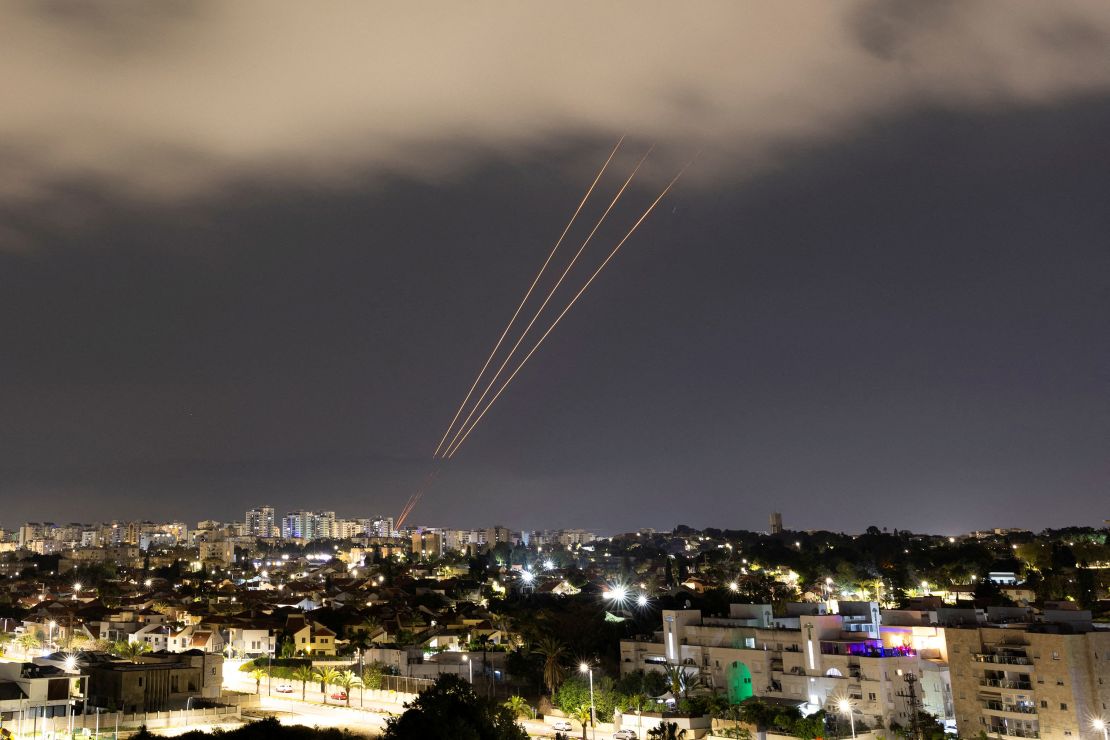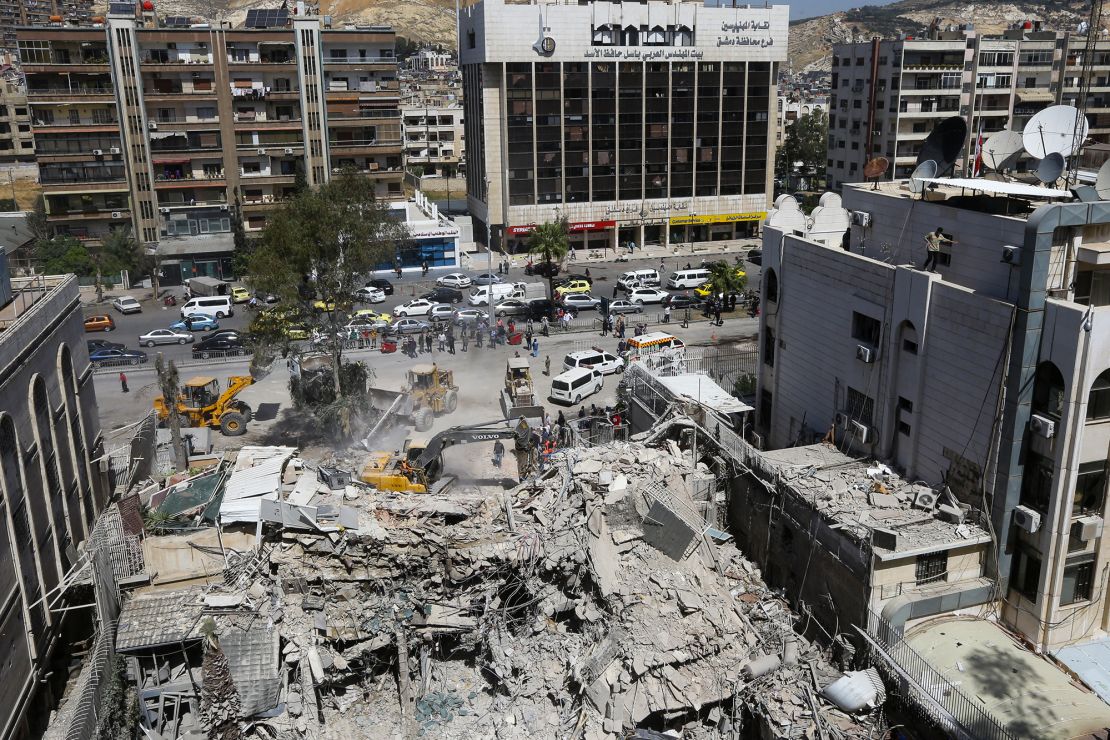Editor’s Notice: A model of this story seems in CNN’s In the meantime within the Center East publication, a three-times-a-week look contained in the area’s greatest tales. Join right here.
CNN
—
Israel has but to agree how to answer the Iranian assault over the weekend that noticed greater than 300 projectiles fired at its territory within the first direct army confrontation between the Islamic Republic and the Jewish state.
Israel should steadiness worldwide stress to point out restraint on the one hand, whereas trying to find an applicable response to an unprecedented assault. Prime Minister Benjamin Netanyahu now has to weigh his right-wing coalition’s name for a robust response towards the chance of additional worldwide isolation for Israel by widening the battle with out worldwide help.
Israel’s battle cupboard on Monday remained decided to answer Iran’s assault for what Iran says was retaliation to a suspected Israeli strike on an Iranian diplomatic constructing in Damascus on April 1. Regardless of stress from allies to not escalate, the cupboard is now debating the timing and scope of the response, two Israeli officers aware of the deliberations advised CNN.
Analysts say that Israel has few choices, and every of these choices comes with a worth for the Jewish state, particularly as it’s already embroiled in a brutal six-month battle with Hamas within the Gaza Strip and is confronting numerous Iran-backed militants within the area.
A direct assault on Iran would set yet one more precedent. Whereas Israel is believed to have performed covert operations in Iran through the years, typically focusing on people or amenities seen as a menace to its safety, it has by no means launched a direct army assault on Iranian territory.
“We’re positively in a brand new section, and a really harmful section of the Israeli-Iranian confrontation,” stated Raz Zimmt, an Iran knowledgeable on the Institute for Nationwide Safety Research (INSS) in Tel Aviv. “Iran has definitely tried to alter the foundations of the sport with Israel… We’d count on extra rounds of direct assaults sooner or later.”
Whereas Israel could discover it exhausting to not retaliate, he stated, it could not conduct an instantaneous “full scale army assault towards targets inside Iran” as Tehran has vowed to retaliate with an excellent larger response than the assault launched over the weekend.

“The choice in Israel has been to proceed and focus on attaining our fundamental aims in Gaza, and to not open new fronts,” Zimmt advised CNN.
Alon Pinkas, a former Israeli diplomat, stated it’s unlikely that Israel will retaliate by instantly putting Iran. But when it does, he stated, the fallout will depend upon the targets. Targets might embody army belongings or the Islamic Republic’s nuclear program, he stated. “Every one represents a unique degree of escalation.”
An Israeli official advised CNN on Monday that among the many army choices being thought of is an assault on an Iranian facility that might ship a message to Tehran however keep away from inflicting casualties. Israeli officers acknowledge that shall be a troublesome needle to string, the official added.
Israel’s response could nonetheless be constrained by the truth that it acted as a part of an off-the-cuff coalition when heading off Iran’s barrage of missiles and drones, Tamir Hayman, Israel’s former head of army intelligence, stated on X.
The assaults had been thwarted with the assistance of allies together with the US, UK and France, as effectively Jordan.
“That is efficient and essential, however it should restrict the liberty of motion in response,” Hayman, who now heads the Institute for Nationwide Safety Research (INSS) in Tel Aviv, stated on Sunday. Western and Arab allies of Israel have been discouraging it from responding to Iran’s assault.
US President Joe Biden and senior members of his nationwide safety crew have advised their Israeli counterparts the US won’t take part in any offensive motion towards Iran, based on US officers aware of the matter. Biden sought to border Israel’s profitable interception of the Iranian onslaught as a serious victory — with the suggestion that additional Israeli response was pointless.

Israel can also be prone to take home political concerns under consideration. Prime Minister Benjamin Netanyahu leads probably the most right- wing coalition within the nation’s historical past, and holding that authorities from collapsing would require appeasement of hardliners.
Netanyahu has come beneath intense criticism at residence for not having the ability to forestall the Hamas-led October 7 assault on Israel and his lack of ability to safe the discharge of the greater than 100 hostages that stay in Gaza.
Pinkas expects any retaliatory resolution by Israel to be closely influenced by Netanyahu’s far-right coalition and the prime minister’s personal wants for political survival.
“With Mr. Netanyahu, it’s all about politics and his personal survival, and the upkeep of his coalition and his need to broaden the battle to distance himself from October 7 and the Hamas assault,” Pinkas stated.
“So, in his thoughts, a regional battle or a direct battle with Iran is in step with the fabricated narrative that he invented, that this (October 7) isn’t just a terror assault however a part of a a lot larger confrontation and marketing campaign,” Pinkas stated.
In Israel, Pinkas added, the general public doesn’t need to open one other entrance, with troops nonetheless combating in Gaza.
“Individuals are nonetheless devastated and shocked over what had occurred in October, so I don’t assume there may be any public need to escalate and open a wholly direct battle with Iran,” he stated.

Forward of the weekend assaults, Israel had grow to be more and more remoted on the world stage resulting from its conduct within the Gaza battle, the place greater than 33,000 Palestinians have been killed. Because the assault by Iran, nonetheless, its allies have rallied across the Jewish state and its proper to guard itself.
Some Israeli politicians have referred to as for the state to make the most of the help gained after the assault to hit again.
Others have referred to as for Israel to make use of the “worldwide credit score” to both assault Tehran or invade Gaza’s Rafah metropolis, the place greater than 1 million Palestinians are sheltering, and which Israel says is Hamas’ final stronghold. A deliberate operation within the metropolis has been delayed amid a world consensus towards it.
“We have to reply — and there are two good choices: Both, we make the most of the assault yesterday in an effort to assault Iran, or to return to an settlement with the USA to enter Rafah, and get rid of Hamas there,” Yaakov Amidror, former nationwide safety adviser to Netanyahu, advised the Jerusalem Publish on Monday.
Israel’s authorities is conscious of the worldwide help and goodwill from its allies and doesn’t need to squander that. On the similar time, it acknowledges that it can’t permit Iran’s first assault on Israeli soil to go unanswered.
Benny Gantz, a key member of the battle cupboard, has pushed for a swifter response to Iran’s assault, two Israeli officers advised CNN. He believes that the longer Israel delays its response to Iran’s assault, the tougher it will likely be to garner worldwide help for it, the sources stated.
Others disagree, saying retaliatory motion from Israel that escalates tensions would solely additional isolate the Jewish state, particularly from Gulf Arab states that Israel seeks to normalize ties with.
Arab states, together with these which might be pleasant with Israel, have expressed concern a couple of potential escalation from Iran’s assault, however haven’t outright condemned it. Israel stated that many of the drones fired from Iran had been intercepted outdoors its airspace. Jordan shot down quite a few these drones and confronted criticism within the Arab world for the transfer. It has argued that it was finished to guard its residents and in response to violations of its airspace.
Regardless of its position in defending Israel, nonetheless, Jordan has not shied away from chastizing the Netanyahu authorities. In an interview with CNN’s Becky Anderson, Jordanian Overseas Minister Ayman Safadi appeared to help Iran’s place that the assault was in retaliation to Israel’s bombing of the Iranian diplomatic constructing in Damascus.
“Now I feel the stress is on Israel to not escalate and work in the direction of the target that all of us share, which is de-escalating the battle,” Safadi stated on Monday, warning that Netanyahu seeks an escalation to shift focus away from the battle in Gaza.
Israel has additionally been on a mission to fix relations with Arab states, a few of which sit throughout the Persian Gulf from Iran, home US army bases and have come beneath hearth from Iran-allied teams previously. These nations have performed a fragile balancing act between ties with Tehran and with Israel, and are cautious of the affect of a full blown Iranian-Israeli battle on their very own stability and oil exports.
“The very last thing they (Gulf states) need proper now could be a conflagration that might elevate oil costs, that might block the Strait of Hormuz,” Pinkas advised CNN, referring to the world’s most essential oil transit level. Relations with these states could also be affected if Israel is seen as liable for such an escalation, he added.











